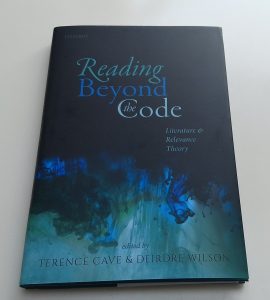* Reading Beyond the Code: Literature and Relevance Theory, edited by Terence Cave and Deirdre Wilson (Oxford, 2018).
* Michael Inzlicht, Amitai Shenhav, and Christopher Y. Olivola, ‘The Effort Paradox: Effort Is Both Costly and Valued’, Trends in Cognitive Sciences 22 (2018), 337-49: doi.org/10.1016/j.tics.2018.01.007
The first of these is a landmark collection made up of essays putting an important theory of communication into conversation with literary criticism. I’m in it so of course I am biased, but I think it includes some outstanding work by people who aren’t me, and I want to make a bit of noise about it. The theory of communication in question is ‘relevance theory’ as formulated by Dan Sperber and Deirdre Wilson, the latter being one of the editors. (The other editor is Terence Cave, whose book Thinking With Literature featured in this post by Emily Troscianko.)
This theory explains communication as a process of inference, based on a recipient establishing the meaning of an utterance with reference to the contexts that make it relevant. It sets itself against ‘code models’ of communication (hinted at in the title of the book) that conceive of the process as a speaker encoding something and a listener decoding it: the importance of contexts, and the resourcefulness of recipients in deducing which of these give an utterance a function, is crucial.
It seems to be that a lot of literary criticism gets by without an explicit theory of communication, and/or indeed by not thinking of reading (or writing) as a kind of communication. At the very least, it seems profitable to me to bring these things back together, and the essays in the book validate that effort. My contribution is about Robert Herrick’s poem ‘Corinna’s Going A-Maying’, and in it I think about how poems communicate across history, the different timescales they inhabit and invoke, and some of the opportunities and problems of a historicist approach.
Relevance theory is referred to as a ‘cognitive pragmatics’. One reason for this is that it shares an effort-reward structure with many models of cognition. The recipient will search for a context that gives relevance, and once a sufficient threshold is reached, then the meaning of the communication will be inferred. The effort will be no more than is required to release enough relevance — in some scenarios not much relevance will be necessary or hoped for, so the effort will be abandoned sooner. Sometimes we are listening carefully and avidly and will be ready to offer more effort for more reward.
The effort-reward dynamic comes into focus in the Inzlicht et al. essay cited above. Their argument is that in various ways the usual assumption, that effort will be avoided if possible, does not always apply. Humans sometimes select activities because they require effort, as if the effort involved adds value. More research is needed, they argue, to understand what attracts people to mountain climbing, ultra-marathons, sudoku, DIY, and ‘the surprising popularity (and fundraising success) of charity events that require those raising money to expend substantial effort to reach their goal’.
They don’t cite the novels of James Joyce or the poetry of J.H. Prynne, but they could have — there are analogous aspects to people’s choices of reading. (The same applies in relation to relevance theory: the number and complexity of the contexts that could release meanings from literary utterances may be formidable, but many find them correspondingly rewarding.) At present there are questions rather than answers, but the attractiveness of difficulty, which may train us to do things, or may make us better people (morally? or just with fitter psychologies?), is a rich topic. More please!
